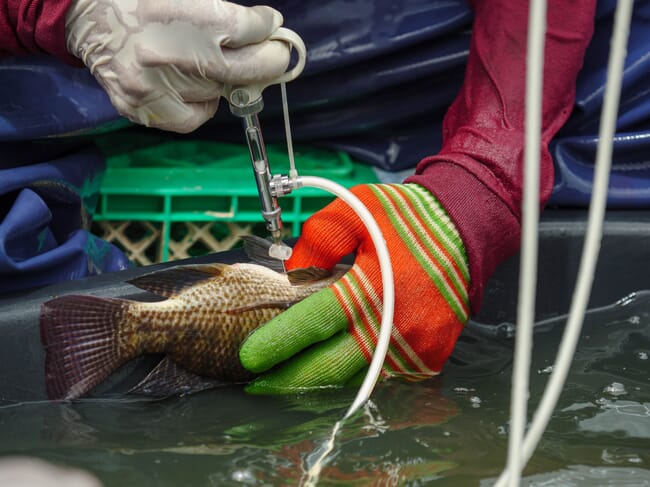While effective injectable bacterin vaccines against Francisella noatunensis subsp. orientalis exist, tilapia farmers would prefer the option of vaccinating the fish by immersion or orally, due to the lower cost and ease of application.
Developing such a vaccine could help to reduce the use of antibiotics in tilapia aquaculture – as these are widely used against the range of bacterial challenges facing the sector.

However, as the researchers behind the trial note, oral and immersion vaccines are often less efficacious probably due to the lack of adjuvants in immersion and oral vaccines.
As a result, the study aimed to optimise the formulation and dose of the Francisella noatunensis vaccine with mucosal adjuvants for oral and immersion delivery.
Methodology
During the trial tilapia fry averaging 6 g were given three concentrations (high, medium, low) of antigen, combined with the oral adjuvant by oral gavage (delivery to the digestive tract via a tube), to optimise the dose needed to induce an immune response to Francisella noatunensis. The immune response obtained was then compared with fish vaccinated by immersion, both with and without an immersion adjuvant.
The fry were then boosted by the same route at 420 degree days (DD), and samples of serum, mucous ) were then taken at 840 DD for specific antibody responses measured by ELISA and western blotting.
The researchers found that “specific IgM titres were significantly elevated in serum and mucus of fish given the high dose adjuvanted vaccine by gavage”.
In addition, by using western blotting with serum, “a significant immunogenic reaction was evident between 20 and 37 kDa in the fish given the high dose oral vaccine by gavage”, they add.
“As protection against Francisella noatunensis provided by the injection vaccine was correlated with specific antibody responses these findings suggest the oral vaccine also has potential to provide protection. Further studies are needed to optimise delivery of the vaccine via feed,” they conclude.
Further information
The results of the study, published in Fish & Shellfish Immunology under the title, Oral vaccination of Nile tilapia (Oreochromis niloticus) against francisellosis elevates specific antibody titres in serum and mucus, are now available in full.


